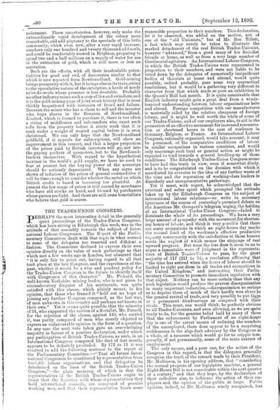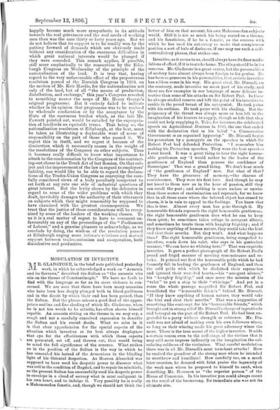THE TRADES-UNION CONGRESS.
PERHAPS the most interesting detail in the generally quiet proceedings of the Trades-Union Congress, which has been sitting in Edinburgh this week, was in the attitude of that assembly towards the subject of Inter- national Labour Congresses. The R"port of the Parlia- mentary Committee dealt with that topic in what seemed to some of the delegates too reserved and diffident a fashion. The Committee declined to express their own - opinion directly on the value of such gatherings as that . which met a few weeks ago in London, but observed that " it is only fair to point out, having regard to all that took place at the late Congress, and the experiences of the past, whether it would be a wise and prudent policy for the Trades-Union Congress in the future to identify itself with Congresses of this character." Mr. Pickard, the well-known Yorkshire mining leader, who is not given to circumlocutory disguise of his sentiments, was quite satisfied with this clause, which plainly meant, in his opinion, that those who framed it "held out no hope of joining any further Congress composed, as the last was, of men unknoWn in this country and perhaps not known in ' their own." Yet it seems quite possible that the minority of 91, who supported the motion of a Socialist, Mr. Parnell, for the rejection of the clause, against 143, who carried it, was partly composed of men who merely objected to express an unfavourable opinion in the form of a question. In any case the next vote taken gave an overwhelming majority in favour of a positive declaration, under which any participation of British Trades-Unions, as such, in an International Congress composed like that of last month, appears to be definitely precluded. By 172 to 11 it was resolved to add the following sentence to the report of the Parliamentary Committee:—" That all future Inter- national Congresses be constituted by representatives from bond-fide labour organisations, and that delegation be determined on the lines of the British Trades-Union Congress,"—the plain meaning of which is that the representatives of the British Trades-Unions ought to insist that the Societies with whose representatives they holdinternational councils, are composed of genuine working men, and that their representation bears some reasonable proportion to their numbers. This declaration, let it be observed, was added on the motion, not of one of the " old Unionists," but of Mr. Ben Tillett, a fact which may surely be taken to illustrate the marked detachment of the real British Trades-Unionist, however " advanced," from a good many of his Socialist friends at home, as well as from a very large number of Continental agitators. An International Labour Congress, in which the British Trades-Unions were represented in proportion to their numbers, and were not liable to be voted down by the delegates of numerically insignificant bodies of theorists at home and abroad, would quite possibly, indeed probably, pass some very unpractical resolutions, but it would be a gathering very different in character from that which made so poor an exhibition in the Queen's Hall last month, It is quite conceivable that English industry might gain a great deal from a wisely- inspired understanding between labour organisations here and abroad. Foreign competition with our manufactures is materially aided by the relative cheapness of foreign labour, and it might be well worth the while of someof our Trades-Unions, and of our employers also, to aid in the promotion of an effective movement for increased remunera- tion or shortened hours in the case of workmen in Germany, Belgium, or France. An International Labour Congress, rationally organised, would take account, it may be presumed, of the comparative conditions of labour in similar occupations in various countries, and would only encourage such local or general action as might be expected to tend towards a general levelling-up of those conditions. The Edinburgh Trades-Union Congress seems to have had this truth in view, even if somewhat dimly, and is to be congratulated on the decision with which it manifested its aversion to the idea of any further waste: of the time and the reputation of working-class leaders in disorderly and unrepresentative gatherings. Yet it must, with regret, be acknowledged that the practical and sober spirit which prompted the attitude taken up by the Edinburgh Congress on the subject of international labour relations----we write in necessary ignorance of the course of yesterday's promised debate on the American Mr. Gomperz's telegram urging.the holding of an International Trades-Union Congress—failed to dominate the whole of -its proceedings. We have a very large amount of sympathy with the movlemeutior. shorten- ing hours of labour, and think it very.possible that there are many occupations in which an eight hours day marks the normal limit of the workman7s effective productive capacity concurrently with the satisfaction -of those human needs the neglect of which means the stoppage of real upward progress. But none the less does it seem to'ats•to argue a lamentable want of judgment in the representa- tives of British Trades-Unions to pass, • by the great majority of 117 (211 to 34), a resolution affirming that "the time has arrived when the hours of labour should be limited to eight per.diem in all trades and occupations in the United Kingdom," and instructing their Parlia- mentary Committee to promote immediate legislation with that object. Nothing can be more certain than that any such legislation would produce the gravest disorganisation in many important industries,—disorganisation so serions as to deprive them of much of their hardly won shareln the general revival of trade, and very possibly to put two at a permanent disadvantage as compared with their rivals. This must, one would think, be perfectly obvious to all Trades-Unionists, and even allowing, as we are4aite ready to do, for the genuine belief held by many of them that the enforcement by Parliament of an. eight -how day is one of the surest means of reducing the numbers of the unemployed, there does appear to be a surprising recklessness in the slap-dash advocacy by the Congress as a whole, of a measure which would go far to cripple tem- porarily, if not permanently, some of the main sources of employment. The only excuse, and a poor one, for the action of .the Congress in this regard, is that the delegates generally recognise the truth of the remark made by their President, Mr. Mallinson, in his opening address, that " considering the normal progress of our legislative machine, a general Eight-Hours Bill is not conceivable within the next quarter of a century," and that they hope, by the declaration of their collective aim, to influence the action of their em- ployers and the opinion of the public at large. Public opinion, indeed, as Mr. Mallinson wisely recognised,. has happily become much more sympathetic in its attitude towards the real grievances and the real needs of working men than was the case thirty or forty years ago. But we do not believe that its support is to be readily won by the putting forward of demands which are obviously made without any consideration of the enormous difficulties in which great national interests would be plunged if they were conceded. This remark applies, if possible, still more emphatically to the reassertion by the Edin- burgh Congress on Wednesday of the principle of the nationalisation of the land. It is true that, having regard to the very unfavourable effect of the preposterous resolution passed at the Norwich Congress in 1894, on the motion of Mr. Keir Hardie, for the nationalisation not only of the land, but of all " the means of production, distribution, and exchange," this year's Congress reverted to something nearer the scope of Mr. Henry George's original programme. But it entirely failed to indicate whether in its opinion that programme was to be realised by wholesale confiscation or by the acceptance by the State of the enormous burden which, as the late Mr. Fawcett pointed out, would be entailed by the expropria- tion of landlords on equitable terms. That being so, the nationalisation resolution at Edinburgh, at the best, must be taken as illustrating a deplorable want of sense of responsibility on the part of those who passed it. We regret this in itself, and we regret it because of the diminution which it necessarily causes in the weight of the resolutions of the Congress on other subjects. Thus it becomes really difficult to know what importance to attach to the condemnation by the Congress of the contract- ing-out clause in the Truck Act of last Session. On that sub- ject and the improvement of the law in regard to employers' liability, one would like to be able to regard the declara- tions of the Trades-Union Congress as conveying the care- fully considered views of a body peculiarly competent to set forth at any rate one side of industrial questions of great interest. But the levity shown by the delegates in regard to some of the wider problems with which they dealt, inevitably damages the authority of their utterances on subjects which they might reasonably be supposed to have examined with the greatest circumspection. We trust that the justice of these considerations will be recog- nised by some of the leaders of the working classes. To us it is a real matter of regret to have to comment un- favourably on any of the proceedings of the " Parliament of Labour," and a genuine pleasure to acknowledge, as we conclude by doing, the wisdom of the resolution passed at Edinburgh urging more intimate relations and mutual support between trades-unionism and co-operation, both distributive and productive.



































 Previous page
Previous page